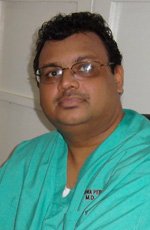EVEN as the Ministry of Public Health and other stakeholders continue to advocate and put measures in place to combat the risk factors of non-communicable diseases (NCD), there needs to be consideration that treatment is tailored to the environments of patients they hope to impact.
This was shared by several speakers as they delivered remarks last Thursday at the opening ceremony of the Texila American University (TAU) International Conference at the institution’s Providence Campus. This year the event was held under the theme: “Non-communicable Diseases (NCDs) in the Caribbean Region: Current Scenarios and Future Perspectives.”
In Guyana, four main NCDs – diabetes, cardiovascular disease, cancer, and chronic respiratory diseases – account for over 70 per cent of all deaths. NCDs are also an issue on a global level, with poor diet, physical inactivity, smoking and excessive alcohol consumption having long since been identified as the major risk factors that predispose persons to the diseases.
Despite public health systems putting increasing measures in place to address these risk factors, the struggle persists in addressing them; and Guyanese continue to die of these diseases in increasing numbers.
Medical Director of Caribbean Surgery Inc, Dr Surendra Persaud, opines that the impeding factor remains the lack of consideration for the environmental, cultural and psychological challenges that many patients and citizens face in effecting lifestyle changes necessary for reducing their risks to NCDs.

“We know what the problem is, we know what the solutions are, so why are we failing? The fundamental problem is that the biggest obstacle to change is human beings; we are collectively the biggest problem,” Persaud said, as he delivered remarks to the audience of mainly medical students.
“As students I beg of you, pause with your patients and get to understand the circumstances in which they find themselves , or you are not going to be the doctor that you should be. There are guidelines everywhere in the world how to treat hypertension and diabetes, but what we can’t beat is what is happening in the home.”
The conduct of doctors and health care providers is a major contributing factor to the challenge.
“We have the greatest role to play to impacting the lives of our patients. We, as physicians, sit on our high horses and say do this and do that, and then when patients come back we abuse [them] for not doing that, that and that; we never ask [them] could you have done them? Did you have the resources? What is most important in your life? We may think it is ok for people to do this, but how many of us as physicians and students have had to take medication for two weeks and have failed to do that,” Persaud said.
Also touching on the point was Chief Medical Officer Shamdeo Persaud.
“In our minds as professionals we know what needs to be done, but putting yourself in that person’s shoes, then you will see how challenging it will become,” Persaud shared during his remarks at the conference.
Dr Surendra Persaud firmly believes that unless our culture is changed, the burden on public healthcare systems in treating NDCs will continue to grow.
“The public health system with all its efforts has a denominator that is impossible to fix. No amount of public health expenditure is going to fix that. It is what is going to kill most of us and it is what is going to bankrupt most countries,” Dr Persaud said.
Also building on Dr Surendra Persaud’s point was Communications Specialist Alex Graham. Graham emphasised during his remarks, the need for education campaigns against NDC risk factors to utilise communication tools better tailored to target audiences. Graham’s presentation was entitled “Simple but difficult.”
“For you who are health care providers, treating NCDs is easy, but for us doing them [reducing risk factors] it is difficult,” Graham expressed.
In countries such as Guyana and the wider Caribbean, cultures and traditions run counter to many of the lifestyle changes required to reduce the risk of NCDs; this is particularly so in the case of diets. Many persons also face social constraints in lifestyle changes involving reductions in alcohol consumption or cutting out tobacco use.
Graham highlights that even as lifestyle changes are being requested of the individual, corresponding changes are needed in the wider society.
“Our culture and regional community was founded on suga; it’s in our DNA; hardwired into our thinking; built into our lifestyle; it’s critical to who we are, so fighting chronic diseases requires us to be different from who we are,” Graham noted.
“Somehow we have not filtered into the rest of our society that they need to be making some transformations to help all of us. Healthcare professionals are good at telling their patients what to do, but we are bad at telling the system and the society what to do.”
Notwithstanding the slow pace of cultural changes in society, government has been putting measures in place to get that change going. In 2017 the National Tobacco Control Act was passed after a five-year process. The Act regulates the sale and use of tobacco products, with the aim of reducing its consumption.
Tobacco use harms every organ of the body and causes more deaths than HIV, illegal drug use, alcohol use, motor vehicle accidents and suicides combined. Dr Surendra Persaud stressed the need for cutting off tobacco use among everyone.
“There is no normal dose of tobacco. It is the single biggest thing you can do for your health. There is no surgery or intervention that I will perform that will give you the benefit that quitting tobacco will do,” he asserted.
On the issue of diet, the government is also doing what it can to address the issue of encouraging healthy eating. Addressing it where it will have the most impact, with children.
“In the education system we’re spending a lot of time working on lifestyle choices, including healthy eating,” notes Minister of Education Nicolette Henry, as she added her remarks to the issue during her address.
She too highlighted the need to address the issue from a cultural standpoint.
“Are we prepared to make the changes that are necessary? We have to address the behaviours [and] look at the patterns and trends,” she said.
The doctors agreed that reducing risk factors of NCDs are most effective when inculcated at a very young age.
“Unless we look at how we are instructing our children from the day they are born, on making healthy choices, we are not going to win this battle,” Dr Surendra Persaud said, as he shared a personal story of his child being teased at school for taking “grass” when she took lettuce.





.jpg)








